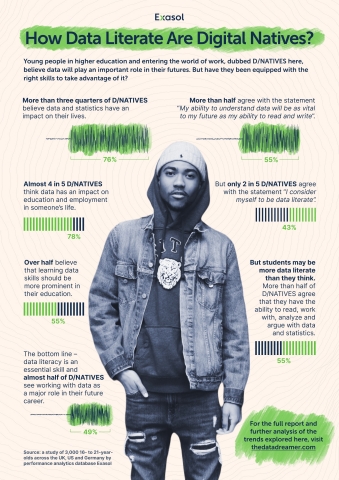ATLANTA--(BUSINESS WIRE)--Exasol, the leading high performance analytics database company, today launched the findings of its new study into the attitudes and understanding that young people currently in higher education or just entering the world of work have towards data. The study of 3,000 16- to 21-year-olds (coined D/NATIVES by Exasol because of their everyday digital skills) finds that despite over half of respondents believing that their ability to understand data will be as vital to their future as their ability to read and write — only 43% actually consider themselves to be data literate. Interestingly, a higher proportion (55%) said they can read, work with, analyze and argue with statistics—which are the required skills for data literacy according to MIT’s definition.
The issue is that D/NATIVES don’t fully realize that their everyday online activities involve a lot of data consumption and analysis—from fitness trackers to entertainment recommendation engines to product reviews and scores. Given this gap in understanding, it is not surprising that D/NATIVES don’t feel equipped to apply their subconscious and habitual data literacy skills to the real world.
Adah Parris, futurist, cultural strategist and contributor to the report comments: “Data literacy is about more than number crunching, it's about being a storyteller. A narrator. As we create data, the data creates us. It is a non-linear process of inter and intra-connected storytelling. Data isn’t this complex, scary thing for technical people. Data is about facts and data literacy is the ability to recognize and interpret the patterns that those facts reveal. On that basis, D/NATIVES might actually be more data literate than they think.”
Exasol’s study also raises questions about the role education plays in preparing young people to enter an increasingly data-driven workplace. The survey reveals that D/NATIVES don’t feel their schooling goes far enough in teaching them the data skills necessary for the workplace—49% believe that working with data will play a major role in their future career. Not surprisingly, over half (55%) believe learning data skills should be more prominent in their education.
“Maybe the role of the educator of the future is not to merely pass on facts (data) and figures but to help D/NATIVES to recognize the interconnectedness and transferability of skills within and across every aspect of their lives,” added Adah Parris.
Moving beyond the education system and into the workplace, today’s business leaders want employees to be able to interpret data so they can make better informed decisions. However, Exasol’s findings suggest that D/NATIVES may fall short of their future employers’ expectations.
“Regardless of job descriptions, the ability to work with data is becoming increasingly crucial in the workplace. In theory, D/NATIVES should have developed the data literacy skills necessary for effective data analysis, storytelling, and visualizations. Their untapped potential could spur a revolution in the way we use data to transform business and improve our daily lives,” said Helena Schwenk, Technology Evangelist at Exasol. “But our survey highlights two issues: a genuine skills shortage when it comes to the more complex data skills gained through the education system and a clear miscommunication between the language D/NATIVES use and the business jargon used by employers. There is work for educators, business leaders and the young people themselves to do to bridge the data literacy gap—to create not just a productive workforce but also a richer society.”
Exasol’s report: “D/NATIVES: The future of your business” aims to help educators and business leaders understand how they can bridge the data literacy gap and unlock the potential of today’s D/NATIVES as they enter an increasingly data-led economy. The report can be downloaded here, on Exasol’s Data Dreamer platform. #ImADataDreamer is designed by modern data professionals, for the modern data professional – uncovering stories of the real people behind data. It’s packed with regular new content and insights from credible voices within the industry – from data visualization experts to data scientists and Chief Data Officers – as they tell stories about how data is changing lives while also sharing their own experiences of working with data.
About the Research
Exasol commissioned Censuswide to survey over 3,000 16- to 21-year-olds in the UK, US and Germany and carried out qualitative discussions with three groups of 18- to 25-year-olds in the respective countries.
About Exasol
The Exasol high-performance analytics database is built to run faster than any other database, delivering next-level performance, scale and ease of use. Analyze billions of rows in seconds; run high-performance analytics securely in the cloud or on-premise; deliver frictionless analytics with self-indexing that automatically tunes performance; and scale out analytics for one transparent price.
To learn more, please visit: www.exasol.com




